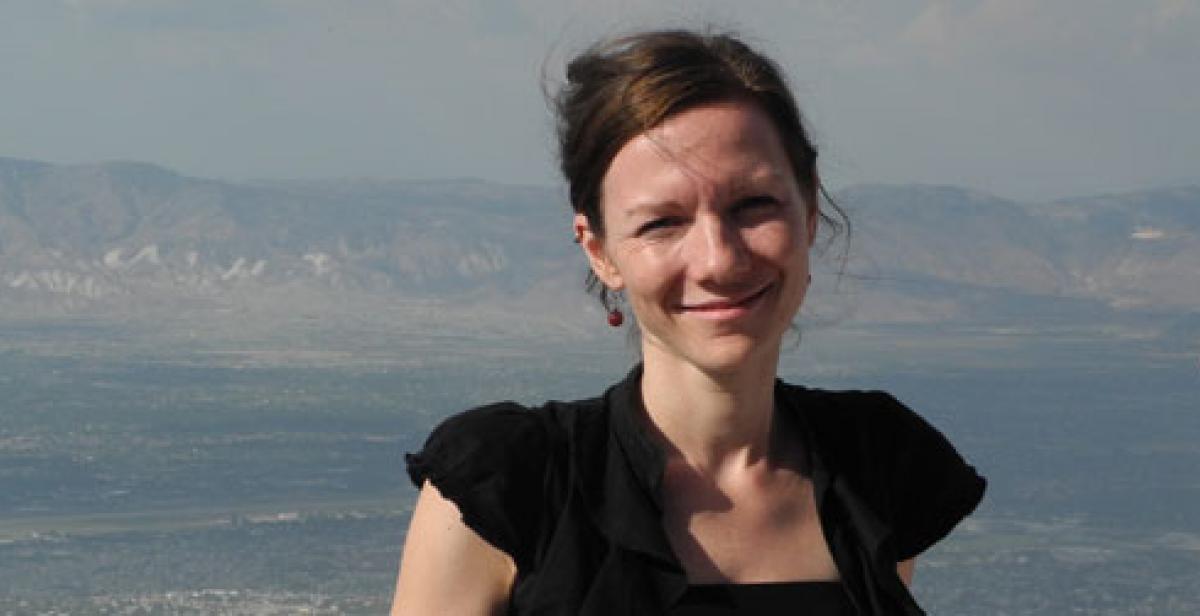Despite the fact that there are still some signs of the earthquake that devastated Haiti’s capital city, nearly three and a half years ago, new buildings are going up everywhere and the sounds of drills and hammers provide an apt soundtrack everywhere we go. There is a sense of ordered chaos in Port au Prince, where the traffic jams last for miles and people hop on and off Tak-Taks that lurch from the pavement and back into the traffic with little notice, if any, given to other drivers.
The school children are all turned out in pristine school uniforms, weaving their way between the women who sit cross-legged at the side of the road selling a vibrant array of fruit. Men lean against the walls that are painted in colourful advertisements for chocolate bars, the main mobile phone network and building material suppliers.
Keeping an eye on government policy
It’s in this lively context that Progressio development worker Esther Schneider (pictured above) is working, in Progressio partner organisation CERFAS - based in a surprisingly cool and calm office in the downtown area. Esther produces reports scrutinising the government’s social policy and budgets in Haiti, collating research from civil society organisations.
“The work of CERFAS is not that dangerous,” Esther says casually, “but it is bold. We are at the forefront of people holding the government to account – or trying to.”
Making a name for themselves
Esther is modest about her achievements whilst working with CERFAS but even she has to admit that “it’s going well.” She says: “We had to readjust our plan a bit to begin with because the reports took longer to put together than we had thought they would, but now we’re very happy with them.
“We’ve really made a name for ourselves and now people and organisations that we used to have to make appointments with are inviting us to meetings and asking what we think.”
Overcoming frustrations
Despite having agreed to stay on working with CERFAS for another year, Esther is upfront about the challenges of working in Port au Prince. “Everything takes a long time, driving anywhere takes ages, all the bureaucracy is slow moving, it can be frustrating but you learn to work with it,” she shrugs.
Fr Kawas, who visited the UK in January of this year, is Esther’s manager. They were the only two staff of the Centre for Social Research (CERFAS) when it was established three years ago and now they have around ten colleagues working on everything from advocacy plans to press releases.
Sharing findings
CERFAS also boasts two small but impressively packed libraries; one is dedicated to sociology and social research owing to Fr Kawas’ own academic background, and the second is full of books about Haiti. Students from the university and Jesuit centre can come and use the libraries for their studies.
Regular meetings are held in the courtyard at the centre of the CERFAS buildings where Esther, Fr Kawas and others share findings of their research. There is always a healthy attendance by the press at these meetings who use CERFAS as a reliable source of information about social policy and budget monitoring.
Lis and I are given a CERFAS calendar as a gift to remember our visit by when we say goodbye to Fr Kawas and we are proudly talked through the photos for each month displaying different aspects of their work, including some of the meetings mentioned above. “Next year you two will be in our calendar!” Fr Kawas jokes after we pose for a photo by the CERFAS sign outside the office… we’ll have to wait and see!
By Lucy Jenkinson, Progressio's media officer. Lucy and Lis Martin (Progressio's environment policy and advocacy officer) were visiting Haiti to carry out research on people's access to and use of water.



